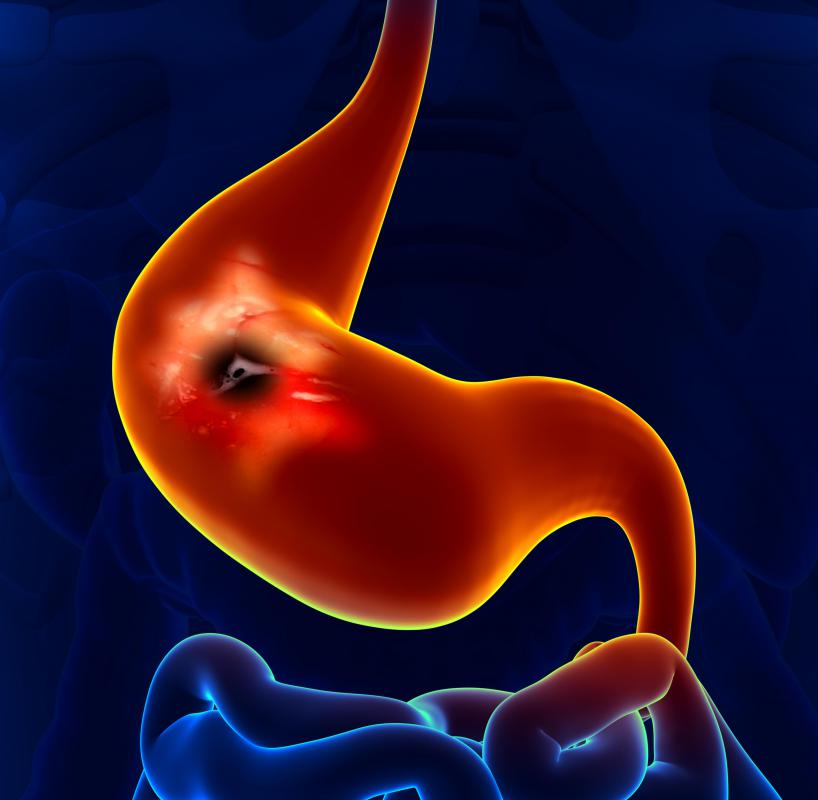At TheHealthBoard, we're committed to delivering accurate, trustworthy information. Our expert-authored content is rigorously fact-checked and sourced from credible authorities. Discover how we uphold the highest standards in providing you with reliable knowledge.
What is Metastatic Stomach Cancer?
Metastatic stomach cancer is a very serious, quickly spreading malignancy. Due to the location and nature of the cancer, it is very likely to metastasize to other parts of the digestive tract, the liver, and lymph nodes. Symptoms may be similar to other stomach problems and can include cramps, loss of appetite, fatigue, and nausea. Early diagnosis and treatment are essential to reduce the risks of widespread metastasis and potentially fatal complications. Patients typically need a combination of surgery and chemotherapy to combat this type of cancer.
Many different factors can increase a person's risk of metastatic stomach cancer. Severe, chronic Helicobacter pylori bacterial infections that cause major damage and ulcers in stomach tissue often precede tumors, for example. People who are frequently sick with other digestive disorders may also be at an increased risk. Other factors may include smoking, alcohol abuse, obesity, and lack of regular exercise. In addition, there is some evidence to suggest that stomach cancer can have a genetic component that is passed down through families.

In most cases, metastatic stomach cancer begins in the innermost mucus lining of the organ. As a tumor starts to grow, cancer can quickly invade deeper layers of muscle tissue. Metastasis to the abdominal cavity, esophagus, intestines, liver, and pancreas can occur in a matter of months. The lymph nodes are also highly susceptible to metastasizing stomach cancer.

Metastatic stomach cancer is unlikely to cause major symptoms in its early stages, and many patients are not diagnosed until significant metastasis has already occurred. Possible early symptoms include abdominal pain and cramps, problems swallowing food, and loss of appetite. A person may start to have frequent episodes of nausea and vomiting, feel weak most of the time, and lose a significant amount of weight in a short period of time. As cancer continues to spread, other symptoms can present, such as muscle aches, joint pain, lymph node swelling, and extreme fatigue.

Several tests are needed when a doctor suspects stomach cancer, including imaging scans and endoscopy. Treatment decisions are made based on the stage of the initial tumor and the degree and location of metastasis. If a small, isolated tumor is discovered, it can often be removed surgically. A large portion of the stomach may need to be excised to get rid of a larger, spreading tumor. Metastasis to other organs may require additional surgeries, chemotherapy, and radiation treatments.

Despite aggressive treatment efforts, metastatic stomach cancer generally has a poor prognosis. People who know they are at risk because of their family histories or lifestyles may be able to prevent future problems by informing their doctors and scheduling regular checkups. The earlier cancer is detected, the better the chances of survival and recovery.
AS FEATURED ON:
AS FEATURED ON:

















Discussion Comments
What are the treatments for secondary abdominal cancer? My doctor is saying chemo every two weeks for the rest of my life.
For some reason, none of the abdominal cancers seem to have a good prognosis, except for colon cancer, and that's only if you catch it early. I don't know why that is.
Any kind of stomach cancer is bad news -- not just the metastatic variety. That's usually late stage, anyway. Maybe the abdominal cancers are hard to treat because they cause so few distinctive symptoms in the early stages.
If I had a family history of stomach cancer, you can bet I'd have myself checked out pretty frequently, and I'd definitely tell my doctor I had a family history of it. Sometimes, mentioning little details like that can make all the difference in your prognosis.
My friend's mom was diagnosed with stomach cancer. Turns out, it was the breast cancer she had been treated for, like 10 years before! The doctor said the cancer cells in her stomach were breast cancer cells.
Her stomach started hardening and she was unable to digest much of what she ate. She was in pain and there wasn't much the doctors could do to relieve it. Apparently, even morphine isn't enough to lessen some kinds of pain. She suffered for probably a year before she finally passed away. It really was a relief for the family. It had been hard watching her suffer.
Post your comments